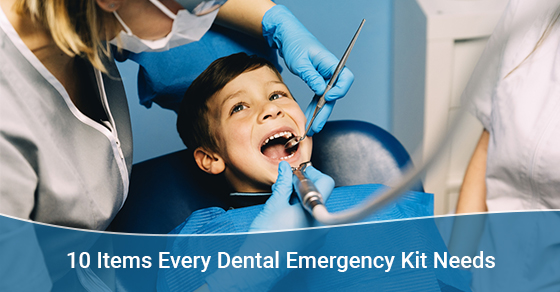
Many homes and schools are equipped with a medical emergency kit for common things like bumps, cuts, scratches, and other minor accidents. But, how often do you see a dental emergency kit? Not as often as you should. There are thousands of dental emergencies every year in Ontario so, it’s more common than you think. It’s always best to be prepared since dental emergencies can be quite painful and uncomfortable. What if you experienced a bad toothache in the middle of the night or while on a road trip with your family? There’s never a convenient time to deal with the stress caused by toothaches or pain, but you should have a dental emergency kit on hand to provide some ease until you’re able to see a dental professional.
If this is the first time you’ve considered the importance of preparing for dental emergencies, you’ll want to check out our list of ten items every dental emergency kit needs:
1. Disposable gloves
Whenever you are dealing with any type of injury that involves blood or other fluids, disposable gloves always come in handy to keep things sanitary.
2. Oral Analgesic Gel
An oral analgesic gel is used to provide temporary relief to toothaches. Using a q-tip, apply one or two drops of topical benzocaine gel and apply to the gums around the tooth that is aching.
3. Clove oil
Clove oil works as a natural source for pain relief. If you are experiencing a lot of pain and have reached the recommended dosage of pain relief meds, you can turn to natural properties like clove oil to provide a bit more pain relief until you’re able to see a dentist to treat any issues.
4. Cotton balls and q-tips
Cotton balls and q-tips are always good to have when cleaning injuries or applying medication. These are absolutely essential when you’re travelling or on the road. Using sanitary materials to clean injuries can help make recovery a lot easier by minimizing the chance of infections.
5. Dental floss
This is a staple when dealing with dental care needs. Dental floss can be helpful during dental emergencies as well as in everyday situations where you might be out of floss during your oral hygiene routine.
6. Toothbrush
Again, another staple of dental care needs. Having an unused toothbrush can be helpful in many situations where someone might need one and it’s not the kind of thing you can share from person to person.
7. Temporary cavity fillings
Most people don’t realize that this amazing product even exists in your average drugstore. It could be your saving grace if a cavity filling actually falls out. If you’ve ever felt the pain and discomfort of a lost filling, you’ll know why a temporary cavity filling is a total necessity in any emergency dental kit.
8. Hydrogen peroxide
This will act as a proper disinfectant in any dental emergency. Hydrogen peroxide will eliminate bacteria and prevent infections when dealing with a dental emergency on your own.
9. Pain relief medication
Dental injuries are painful. The only thing that will get you through the pain until you’re able to see a dentist is pain relief medications such as ibuprofen or acetaminophen. Take as recommended to help relieve any toothaches and pain.
10. Gauze
In situations where you might experience bleeding, gauze can help stop and control the bleeding. Always keep gauze in your dental emergency kit to ensure you have a sanitary material that won’t fray or shed fibres into the wound.
If you find yourself in an unfortunate situation of a dental emergency, whether it’s a toothache or a cracked tooth from a hit or fall, contact your local emergency dental office. Dental emergencies can cause a considerable amount of pain and discomfort. If you’re on vacation or visiting a place where it might be challenging to find a trustworthy dentist, your dental emergency kit may be enough to provide you comfort until you get home.
The best way to prevent a dental emergency is to be proactive and visit your family dentist for regular cleanings. It is usually during your regular dentist visits that any dental problems can be detected and treated before they result in an emergency.
Even though toothaches feel like they just happen instantaneously, it’s usually a prolonged issue that hasn’t been treated like tooth decay, gum disease, or an infection. It is likely that these issues were present for quite some time and left untreated. Visiting your dentist every six months is the recommended time frame and your best way of taking preventative measures.
For more information about dental emergencies and how you can prevent them, call Oakville Place Dental at (905) 842-6030 or contact us here.
 0 Comment
0 Comment